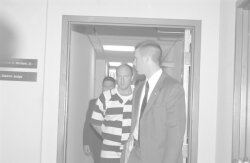Cleared in Spotsylvania
Four days after pleading his innocence in the brutal 1996 slaying of two hikers in Shenandoah National Park, Darrell David Rice has been ruled out as a suspect in the long-unsolved Spotsylvania child killings.
Spotsylvania police announced Monday, April 29, that a DNA profile of forensic evidence from the murders of three Spotsylvania girls in 1996 and 1997 didn't match Rice's DNA.
The Spotsylvania cases terrified Central Virginia. While her 21-year-old sister was inside the house, 16-year-old Sophia Silva was silently abducted from her front porch in September, 1996. Eight months later, sisters Kati and Kristin Lisk, ages 12 and 15, were taken from their home and killed.
Spotsylvania authorities have endured myriad problems in solving the cases. Most notably, they went so far as to name and jail a suspect in 1997, but after the state crime lab admitted it misread some fiber evidence, the suspect was released with an apology.
Many Virginians have noticed that Rice bears a striking resemblance to police sketches of a man wanted in the 1996 killing of Alicia Showalter Reynolds, but Rice has never been named as a suspect in that crime.
Rice was arrested in July, 1997, for attacking a female bicyclist on the Skyline Drive. He pleaded guilty to a charge of attempted kidnapping and had been incarcerated in the federal prison in Petersburg.
Rice appeared in Charlottesville on April 25 to answer the charges in the murder of Julianne Williams and Lollie Winans, the hikers whose throats were cut at their campsite.
Wearing the distinctive black and white striped jumpsuit of the Central Virginia Regional Jail in Orange, to which he was recently transferred, a shackled Rice was led into U.S. District Court in downtown Charlottesville. A retinue of six television crews and three still photographers captured the scene.
Judge Waugh Crigler concluded that Rice couldn't afford an attorney and appointed local attorney Fred Heblich without charge.
Rice's plea: "Not guilty, sir."
Before being handcuffed at the close of the arraignment, Rice waved to his mother and sister, who then slipped out through an emergency exit. "We just came here today to support Darryl," said his sister, as she deflected questions from reporters.
Rice's hair appeared grayer than the reddish tint in the mug shot widely distributed with his April 9 indictment. According to a source, numerous witnesses had been quietly trekking to Charlottesville over the past few months to appear before the grand jury.
The indictment was unsealed April 10 at a Washington press conference presided over by Attorney General John Ashcroft. According to Thomas Bondurant, the prosecutor in the case, it will be Ashcroft who makes the decision whether to seek the death penalty.
The government, which has jurisdiction because the murders occurred in a National Park, is treating the deaths of Williams, 24, and Winans, 26, as "hate" crimes– alleging that these victims were chosen on the basis of their gender and/or sexual orientation.
As he revealed to investigators after attacking another woman in the Park in 1997, Rice targets women because they're "more vulnerable." The indictment also says he "hates gays," although the source of that alleged comment has not been revealed, and at least one of Rice’s friends denies the allegation.
After court adjourned, Heblich informed the press that he hadn't seen any evidence, that he'd only met Rice that morning, and that Rice seemed "composed."
"The crime happened in 1996," said Heblich. "They've had five years to investigate it, but it's only now that they've charged him."
